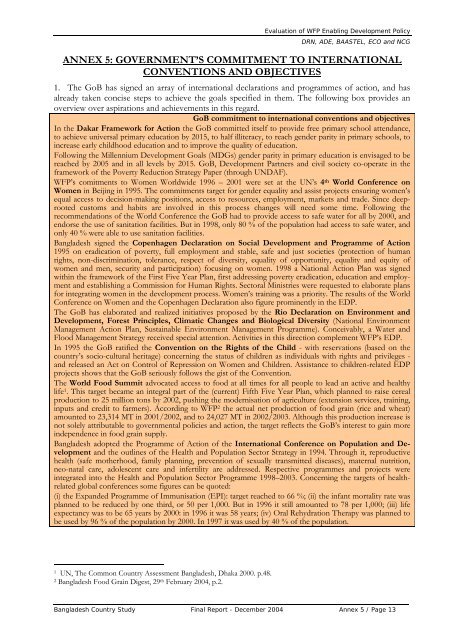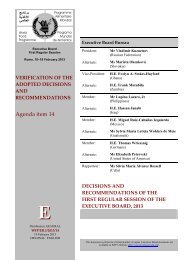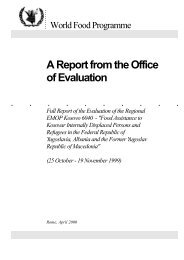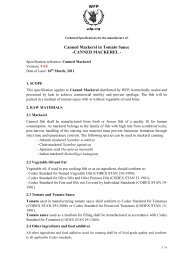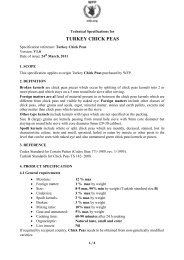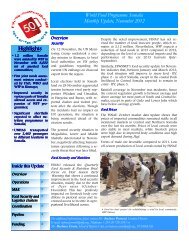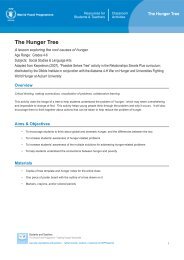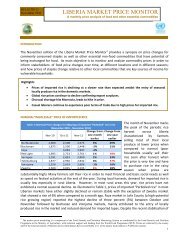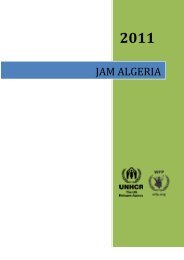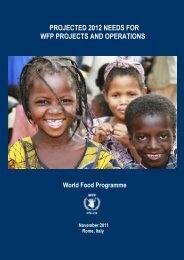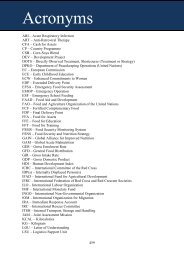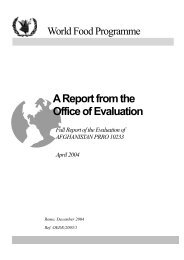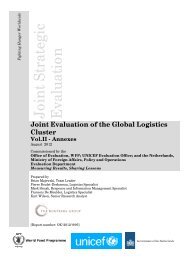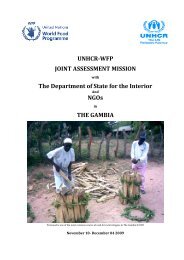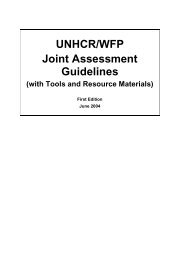bangladesh country study - WFP Remote Access Secure Services
bangladesh country study - WFP Remote Access Secure Services
bangladesh country study - WFP Remote Access Secure Services
You also want an ePaper? Increase the reach of your titles
YUMPU automatically turns print PDFs into web optimized ePapers that Google loves.
Evaluation of <strong>WFP</strong> Enabling Development Policy<br />
DRN, ADE, BAASTEL, ECO and NCG<br />
ANNEX 5: GOVERNMENT’S COMMITMENT TO INTERNATIONAL<br />
CONVENTIONS AND OBJECTIVES<br />
1. The GoB has signed an array of international declarations and programmes of action, and has<br />
already taken concise steps to achieve the goals specified in them. The following box provides an<br />
overview over aspirations and achievements in this regard.<br />
GoB commitment to international conventions and objectives<br />
In the Dakar Framework for Action the GoB committed itself to provide free primary school attendance,<br />
to achieve universal primary education by 2015, to half illiteracy, to reach gender parity in primary schools, to<br />
increase early childhood education and to improve the quality of education.<br />
Following the Millennium Development Goals (MDGs) gender parity in primary education is envisaged to be<br />
reached by 2005 and in all levels by 2015. GoB, Development Partners and civil society co-operate in the<br />
framework of the Poverty Reduction Strategy Paper (through UNDAF).<br />
<strong>WFP</strong>’s comitments to Women Worldwide 1996 – 2001 were set at the UN’s 4 th World Conference on<br />
Women in Beijing in 1995. The commitments target for gender equality and assist projects ensuring women’s<br />
equal access to decision-making positions, access to resources, employment, markets and trade. Since deeprooted<br />
customs and habits are involved in this process changes will need some time. Following the<br />
recommendations of the World Conference the GoB had to provide access to safe water for all by 2000, and<br />
endorse the use of sanitation facilities. But in 1998, only 80 % of the population had access to safe water, and<br />
only 40 % were able to use sanitation facilities.<br />
Bangladesh signed the Copenhagen Declaration on Social Development and Programme of Action<br />
1995 on eradication of poverty, full employment and stable, safe and just societies (protection of human<br />
rights, non-discrimination, tolerance, respect of diversity, equality of opportunity, equality and equity of<br />
women and men, security and participation) focusing on women. 1998 a National Action Plan was signed<br />
within the framework of the First Five Year Plan, first addressing poverty eradication, education and employment<br />
and establishing a Commission for Human Rights. Sectoral Ministries were requested to elaborate plans<br />
for integrating women in the development process. Women’s training was a priority. The results of the World<br />
Conference on Women and the Copenhagen Declaration also figure prominently in the EDP.<br />
The GoB has elaborated and realized initiatives proposed by the Rio Declaration on Environment and<br />
Development, Forest Principles, Climatic Changes and Biological Diversity (National Environment<br />
Management Action Plan, Sustainable Environment Management Programme). Conceivably, a Water and<br />
Flood Management Strategy received special attention. Activities in this direction complement <strong>WFP</strong>’s EDP.<br />
In 1995 the GoB ratified the Convention on the Rights of the Child - with reservations (based on the<br />
<strong>country</strong>’s socio-cultural heritage) concerning the status of children as individuals with rights and privileges -<br />
and released an Act on Control of Repression on Women and Children. Assistance to children-related EDP<br />
projects shows that the GoB seriously follows the gist of the Convention.<br />
The World Food Summit advocated access to food at all times for all people to lead an active and healthy<br />
life 1. This target became an integral part of the (current) Fifth Five Year Plan, which planned to raise cereal<br />
production to 25 million tons by 2002, pushing the modernisation of agriculture (extension services, training,<br />
inputs and credit to farmers). According to <strong>WFP</strong> 2 the actual net production of food grain (rice and wheat)<br />
amounted to 23,314 MT in 2001/2002, and to 24,027 MT in 2002/2003. Although this production increase is<br />
not solely attributable to governmental policies and action, the target reflects the GoB’s interest to gain more<br />
independence in food grain supply.<br />
Bangladesh adopted the Programme of Action of the International Conference on Population and Development<br />
and the outlines of the Health and Population Sector Strategy in 1994. Through it, reproductive<br />
health (safe motherhood, family planning, prevention of sexually transmitted diseases), maternal nutrition,<br />
neo-natal care, adolescent care and infertility are addressed. Respective programmes and projects were<br />
integrated into the Health and Population Sector Programme 1998–2003. Concerning the targets of healthrelated<br />
global conferences some figures can be quoted:<br />
(i) the Expanded Programme of Immunisation (EPI): target reached to 66 %; (ii) the infant mortality rate was<br />
planned to be reduced by one third, or 50 per 1,000. But in 1996 it still amounted to 78 per 1,000; (iii) life<br />
expectancy was to be 65 years by 2000: in 1996 it was 58 years; (iv) Oral Rehydration Therapy was planned to<br />
be used by 96 % of the population by 2000. In 1997 it was used by 40 % of the population.<br />
1 UN, The Common Country Assessment Bangladesh, Dhaka 2000. p.48.<br />
2 Bangladesh Food Grain Digest, 29 th February 2004, p.2.<br />
Bangladesh Country Study Final Report - December 2004 Annex 5 / Page 13


